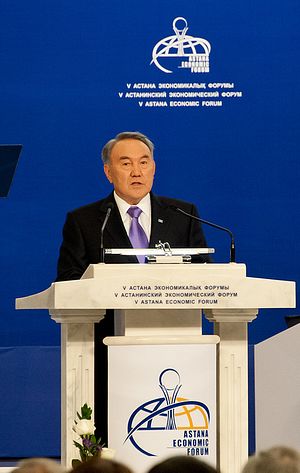While much of the focus on Kazakhstan President Nursultan Nazarbayev’s surprise speech last week centered on the president’s proposed economic readjustment – comparable to America’s New Deal, said the country’s foreign minister – Nazarbayev also included an additional passage worth noting. Toward the close of the lengthy speech, Nazarbayev turned his focus from infrastructure projects to social cohesion, and the country’s ethnic harmony.
“To pass a global test of maturity, we must be united,” Nazarbayev said, according to the official transcript of the November 11 speech. “We must strengthen the trust between all the people of Kazakhstan! Be tolerant of each other! This is the key to the future of Kazakhstan. Interethnic harmony is life-giving oxygen. … We need to ourselves protect our unity and our interethnic accord.”
In most years prior, such lofty language would have seemed relatively boilerplate. This year, though, rhetoric surrounding inter-ethnic harmony in Kazakhstan carries a sudden urgency. With an ethnic Russian population officially comprising approximately one-fifth of the country’s inhabitants, Kazakhstan has been unable to shake comparisons to Ukraine following Russia’s invasion and occupation of Crimea, as well as Moscow’s rhetorical and materiel support for separatists in Ukraine’s east. Inter-ethnic strains were not helped by recent comments from Russian President Vladimir Putin, who condescendingly claimed ethnic Kazakhs had never enjoyed statehood prior to 1991 – while failing to push back against the narrative of rising Russophobia in Kazakhstan.
To be sure, the concept of Kazakh nationalism seems to have experienced a discernible uptick in 2014 – though it would appear to come largely in response to perceived Russian chauvinism within, and dominance of, the forthcoming Eurasian Union as anything else. As Russia’s economic malfeasance and willingness to flout extant borders in Ukraine continue to stall Central Asia’s economic growth, it is plausible that fingers will continue to point at Moscow. And this reality seems to be finally getting through in Astana. The pairing of Nazarbayev’s rhetoric on fiscal troubles and ethnic harmony seem to indicate Astana may finally realize the intrinsic relationship between the two.
While Kazakhstan does maintain a discernible history of separatism in its Russian-heavy lands, any current strains seem relegated to online postings at the moment. But that hasn’t stopped condescension from Moscow officials toward the region. One official, Sergei Lisovskii, recently claimed that Tajikistan considers itself a cultural part of the Russian sphere, a clear allusion to the concept of Russkiy Mir Putin has pushed within the region for some time. Lisovskii, however, didn’t simply lay claim to an entire nation’s cultural direction – he also slammed the Chinese presence in the region. “The creation of a local [Chinese] diaspora can lead to internal conflict and other problems,” he said. “…The Chinese have always lived apart, and if there are too many of them, there will be a problem.”
The timing of Lisovskii’s comments should help offer a bit of context, coming as they did soon after Beijing had apparently pledged $6 billion to Dushanbe – far outstripping anything Russia could offer Tajikistan financially. Emphasizing ethno-cultural links remains one of the few cards Russia can play in Central Asia. It remains to be seen whether Nazarbayev’s focus on ethnic harmony or Russia’s cultural emphasis in Tajikistan will have any effect. But the concern within Astana, and the condescension within certain circles of Moscow – toward both Central Asians and Chinese communities – indicate the supra-regional tensions bubbling through the region. As Paul Goble noted this month, “Russia and China, however much many hope or fear otherwise, are on a collision course in Eurasia[.]” Nothing in the past few weeks has changed this trajectory.
































